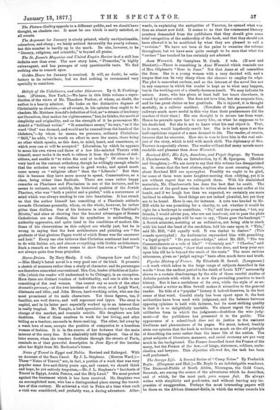Beliefs of the Unbelievers, and other Discourses. By 0. B.
Frothing- ham. (Putnam, New York.)—We have in this little volume a repro- duction of the views of Mr. Theodore Parker, of whom, no doubt, the author is a hearty admirer. He looks on the distinctive dogmas of Christianity as obsolete,—at all events, in his opinion they ought to be obsolete. Mr. Matthew Arnold's definition of God, as "a stream of tendency not Ourselves, that makes for righteousness," has, he thinks, the merit of simplicity and originality, and on the strength of it he pronounces Mr. Arnold a "brilliant writer." "It sometimes seems," he says, " as if the word' God' was doomed, and would not be rescued from the hands of the idolaters,"—by whom he means, we presume, ordinary Christians. "Still," he adds, "it is worth an effort to save the name, there being no other which speaks, as this does, to mind, heart, and conscience, or which ever can or will be accepted." Liberalism, by which he appears to mean his own views and those of a few like-minded Theists with himself, must make it its work to release it from the thraldom of defi- nitions, and enable it " to voice the soul of to-day." Of course he is very hard on the current orthodoxy, though he willingly enough admits that the orthodox are very zealous in good works, and spend much more money on " religious effort " than the " Liberals." But then this is because they have more money to spend, Conservatives, as a class, being richer than Radicals. There are some rather happy remarks on Pharisees and Pharisaism in one of the lectures, and be WOMB to estimate, not unfairly, the historical position of the Jewish Pharisee, who was "both a patriot and a pietist," with a narrowness of mind which was always tending to run into fanaticism. It has struck us that the author himself has something of a Pharisaic attitude towards Christians generally, whom, on the whole, however, ho rather pities than dislikes. One of his lectures is called " The Cardinal's Biretta," and aims at showing that the boasted advantages of Roman Catholicism are an illusion, that its symbolism is misleading, its authority oppressive, and quite fatal to the conditions of modern life. Some of his observations on this subject are wholly just, but he is wrong in saying that the best architecture and painting are " the products of that glorious Pagan world of which Rome was the successor and heir." Every one else believes that Christian sentiment had much to do with Italian art, and almost everything with Gothic architecture. Such a remark as the above seems to show that even a "Liberal" is not always quite free from prejudice.






































 Previous page
Previous page